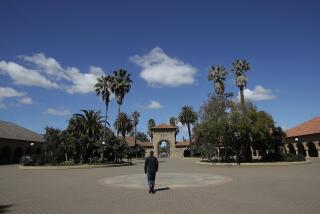Fewer College-Bound Blacks in Ex-Segregated States, Study Says
- Share via
WASHINGTON — More than 40 years after the Supreme Court ordered an end to school segregation, a study finds that African Americans continue to lag behind whites in reaping the benefits of higher education in the 19 states that once operated legally segregated school systems.
“Race remains a powerful and persistent barrier to the full and equal participation of blacks in higher education,” said the study, released today by the Southern Education Foundation, a 61-year-old nonprofit organization promoting minority education.
The study was based on data supplied by the 16 Southern states that sanctioned slavery before the Civil War, plus Missouri, Ohio and Pennsylvania, states that ran officially segregated schools before the Supreme Court’s 1954 Brown vs. Board of Education decision. It concluded that blacks are generally underrepresented at all levels of higher education, from college freshmen to doctorate-degree candidates, and that most blacks continue to attend separate colleges and universities.
The major factors limiting access to higher education, the report said, include continuing high levels of poverty and low incomes among African Americans in the South, as well as the often-inferior quality of the elementary and secondary educations they receive.
Another key is the tendency across the South to award financial aid on the basis of merit rather than need, the report asserted.
“Despite some promising initiatives in these states, remnants of the past continue to restrict opportunities for black students, limiting their aspirations and threatening a region’s hopes for a brighter future,” the report said.
Robert A. Kronley, author of the report, said state officials are reluctant to challenge widespread opposition to programs that benefit one race or class of students over another.
“State officials are a little bit timid about moving. They are timid about the political climate,” he said.
But some progress has occurred in the region, Kronley said. “Attitudes have changed. States that once said, ‘Never,’ are now saying, ‘How?’ ”
Still, seeking to dispel what he called “wishful thinking,” Kronley noted that, although the total number of blacks entering colleges in the region covered by the report has risen over the last 20 years, the percentage of blacks in freshman classes has remained almost stagnant.
For the region as a whole, 15% of beginning, full-time college freshmen were black in 1976; by 1996, the percentage had risen to only 17%. Nine of the states reported that the percentage of black freshmen in public colleges and universities had actually declined between 1991 and 1996.
Similarly, the percentage of African Americans among those earning bachelor degrees has risen very slowly, from 8.5% in 1976 to 10.3% in 1995, the report found.
In 13 of the 19 states, about half of all beginning black college freshmen were enrolled at historically black schools or at community colleges. Conversely, although blacks represented 20% or more of college-age freshmen in most of the 19 states, they accounted for less than 9% of first-year students at the states’ flagship universities on average.
Historically, black colleges have often had lower admissions standards and less-demanding academic programs than predominantly white schools--reflecting the less-rigorous preparation of black students. And only a small fraction of students who enroll in community colleges ever earn a bachelor’s degree--about 7% of blacks and 12% of whites, Kronley said.
Along with Pennsylvania and Ohio, the states covered by the report were Alabama, Arkansas, Delaware, Florida, Georgia, Kentucky, Louisiana, Maryland, Mississippi, Missouri, North Carolina, Oklahoma, South Carolina, Tennessee, Texas, Virginia and West Virginia.
More to Read
Sign up for Essential California
The most important California stories and recommendations in your inbox every morning.
You may occasionally receive promotional content from the Los Angeles Times.










